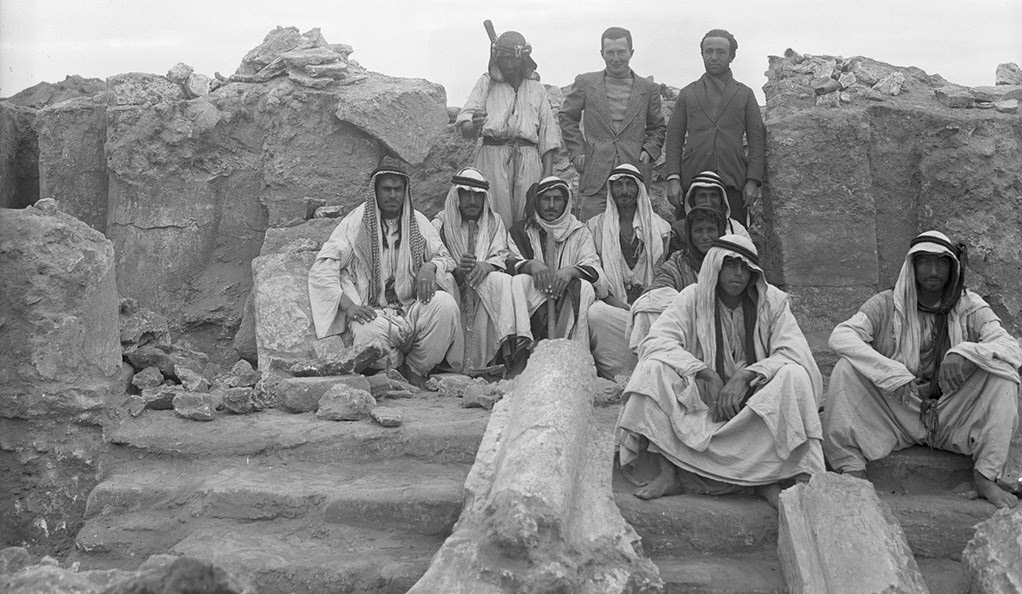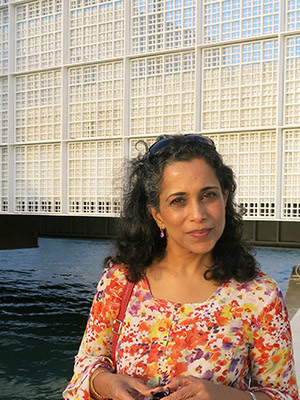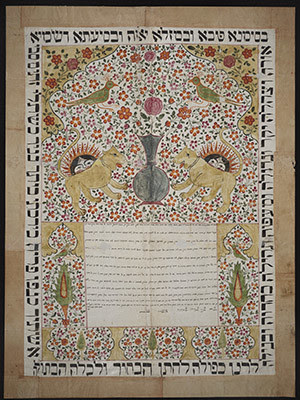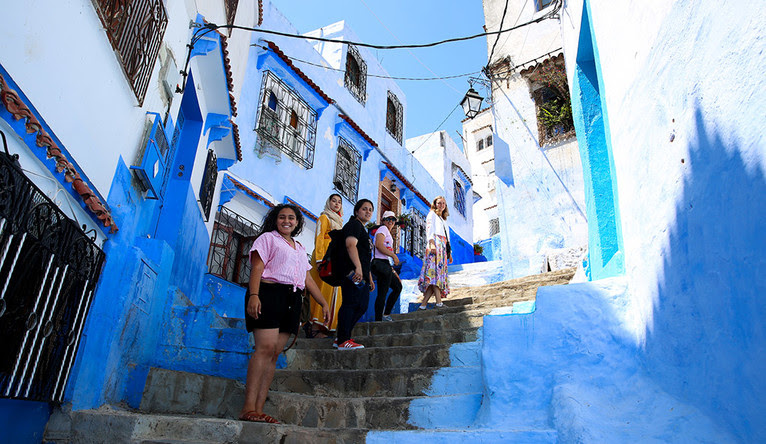Yale.edu
A photograph of archaeologist Frank Brown and his crew in the Temple of the Gadde at Dura-Europos, Syria, during the 1934–1935 joint excavation of the ancient city by Yale and the University- Académie des Inscriptions. (Yale University Art Gallery, Dura-Europos Collection)
Last spring, Kishwar Rizvi, professor of the history of art, led a group of eight graduate students to the United Arab Emirates (UAE) as part of her seminar “Museum and Nation.” Rizvi’s students conducted fieldwork there and later hosted a symposium on their research.
The students belong to a community of scholars across Yale engaging with the Middle East. Faculty and students are examining the region’s history, art, cultures, conflicts, and politics. They are forging relationships at universities and institutions from North Africa to the Persian Gulf. They are bringing leading scholars and artists from the Middle East to campus to share their work and ideas with new audiences.
Yale’s Council on Middle East Studies is the hub for this scholarship and outreach. The council, based at The Whitney and Betty MacMillan Center for International and Area Studies at Yale, supports research projects and language instruction, sponsors public programming, and provides opportunities for Yale students to work throughout the Middle East in places like Morocco, Lebanon, and the UAE.
The U.S. Department of Education recently renewed Yale’s funding as a National Resource Center, making it one of only 14 universities nationwide to receive the four-year federal grant for instruction and research on the Middle East.
Kishwar Rizvi, professor of the history of art.
Rizvi, the council’s chair, says that federal funding recognizes Yale’s strengths in the region, which she notes may not be obvious at first glance.
“The strengths of our faculty working on the Middle East cut across historical periods, geography, and disciplines,” she said. “From the humanities and social sciences to medicine and public health, there is a Middle East presence in nearly every school or department on campus.”
A sampling of recent scholarship by Yale researchers underscores Rizvi’s point:
Hani Mowafi, associate professor of emergency medicine at the Yale School of Medicine, has studied the capacity of hospitals providing trauma care in war-ravaged Syria.
Abbas Amanat, the William Graham Sumner Professor of History, recently published “Iran: A Modern History,” a monumental study of the development of modern Iran.
Catherine Panter-Brick, professor of anthropology, health, and global affairs, has led a series of studies examining the mental health and resilience of children and adolescents displaced by conflict in Syria.
Kaveh Khoshnood and Robert Heimer, professors of epidemiology at the Yale School of Public Health, have examined the risk of HIV/AIDS and access to care among vulnerable populations in Lebanon.
This and other work expands on the traditional strength of Yale’s Department of Near Eastern Languages and Civilizations (NELC), which continues to produce important scholarship in Islamic studies, Egyptology, Assyriology, and languages such as Arabic, Persian, Turkish, Aramaic, and Hebrew, Rizvi said.
Using Yale’s collections
The council is developing a range of projects, programs, and initiatives to further strengthen Yale’s presence in the region and open new avenues of research, teaching, and public outreach.
Two projects in the works will improve access to Yale’s extensive and diverse collections of Islamic and Middle Eastern art, artifacts, books, and manuscripts. “Dura-Europos, Syria: Loss and Recovery from Antiquity to Modernity” is a digital project that will draw on Yale’s collection of artifacts from the ancient city of Dura-Europos to allow people to explore an important archeological and cultural site made inaccessible by conflict. The project is a partnership between the council, faculty in the Departments of History of Art and Computer Science, and curators and conservators at the Yale University Art Gallery and the Institute for the Preservation of Cultural Heritage at Yale’s West Campus.
This ketubah, or Jewish marriage contract, from Isfahan, Iran, in 1856 is held at the Beinecke Rare Book & Manuscript Library. Yale holds extensive collections of Middle Eastern art and artifacts.
“We’ve been thinking about ways we can intervene in Syria,” Rizvi said. “We don’t have a field site there but we have this incredible collection from Dura-Europos that is evidence of the site’s rich history as multi-cultural crossroads where temples existed alongside churches and synagogues. The project will share this amazing resource with the public and make it available for research and teaching.”
“Visual Resources of the Middle East at Yale,” a second digital project, is an open-access database of historical prints, photograph, paintings, and other materials held at the university’s museums and libraries, ranging from medieval Qur’an manuscripts to contemporary photography.
The council is partnering with the Yale Program for the Study on Anti-Semitism (YPSA) to launch a campus-wide discussion in spring 2019 on the study of Muslims, Jews, and Christians in the Middle East. It is also helping to launch the YPSA’s Iranian Jewish Archives, a collection of testimonies by members of Iran’s Jewish community in diaspora that seeks to illuminate the status of minorities and human rights in Iran and preserves memories from the Middle East’s oldest and last-remaining Jewish community outside of Israel.
Rizvi, whose current research includes a study of contemporary museums in the Arab states on the Persian Gulf, has partnered with the Smithsonian Institution, on The Global Museum, an international research project investigating the ways in which museums shape national identity and spark social change. The project will include new undergraduate courses co-taught with faculty and curators at Yale and the Smithsonian museums, as well as international symposia and workshops.
Building bridges abroad
Another council initiative focuses on strengthening and forging new relationships with scholars and institutions in the region — specifically in Morocco, Lebanon, and the UAE — by organizing conferences and workshops with scholars from these countries and creating research opportunities for Yale students and faculty.
Jonathan Wyrtzen, associate professor of sociology and international affairs, has built ties with Al Akhawayn University in Morocco. In 2012, he started a summer session program that sends about 15 undergraduates to take a Yale class on the society and politics of North Africa, based at Al Akhawayn University in Ifrane — a town in the Middle Atlas mountains south of Fez — and in Rabat, Morocco’s capital city. Jonas Elbousty, senior lector in Yale’s NELC department, has also developed an intensive summer Arabic program in Rabat in which 10-15 Yale students participate.
Yale undergraduates tour Chefchaouen, known as the blue city, in Northern Morocco during an eight-week intensive Arabic study program last summer. (Photo credit: Rosie Shaw)
“Every summer, there are 30 to 35 Yale undergraduates studying in Morocco,” said Wyrtzen, whose research focuses on society and politics in North Africa and the Middle East. “Building off of that, the idea is to create denser ties between faculty, undergraduate, and graduate students at Yale and their peers at Al Akhawayn.”
The two universities are developing a faculty exchange in which Al Akhawayn faculty will visit New Haven and Yale faculty will travel to Ifrane for two weeks over their respective spring breaks to lead workshops, network, and conduct research, Wyrtzen said.
Another initiative is for Yale and Al Akhawayn faculty to co-develop workshops on themes including gender, sustainability, religion, and pluralism that will involve graduate-student exchanges.
Khoshnood, associate professor of epidemiology, has helped foster a relationship with the American University of Beirut (AUB). He has worked with partners at AUB to organize manuscript-writing workshops to assist scholars from the region in getting their work published in leading journals.
Khoshnood also has developed Conflict, Forced Displacement, and Health, a joint Yale-UAB graduate research project that regularly sends graduate students from the School of Public Health to Lebanon to work with colleagues at UAB on studies of public health issues.
“AUB is a top-notch research university operating in some challenging circumstances,” said Khoshnood, who has worked on research projects examining access to HIV/AIDS testing and care in Lebanon. “The people trained there take up leadership roles throughout the region. It makes sense for Yale to have a strong relationship with an American university in the region.”
Khoshnood, who is working on multiple research projects in Lebanon, credits Marcia Inhorn, the William K. Lanman Jr. Professor of Anthropology and International Affairs, for opening doors to AUB. Inhorn, whose work has focused on the social impact of infertility and assisted reproductive technologies in Lebanon, Egypt, and the UAE, has served as a visiting professor at AUB.
Fadlo Khuri ’85 B.A., the president of AUB, will visit Yale next month to give a talk and discuss potential collaborations with the School of Public Health.
Once you’ve visited a place, you understand it in a much more complex way.
Kishwar Rizvi
Following up on Rizvi’s travel seminar to Dubai, Khoshnood and Wyrtzen will lead graduate seminars to Lebanon and Morocco, respectively.
The travel seminars offer graduate students excellent training in performing research on the ground in a foreign country, Rizvi said.
“Once you’ve visited a place, you understand it in a much more complex way,” she said. “The students learn how to conduct fieldwork: what it means to interview people; how to work in an unfamiliar place; even how to present yourself across unfamiliar cultures. It is invaluable and I’m excited that we’ll be offering these opportunities more regularly.”
Working on campus and within the community
Closer to home, the council is supporting new initiatives to promote cultural and religious literacy about the Middle East and relevant language instruction in New Haven — a city that has recently welcomed a large community of Syrian refugees.
The council is working with Dina Roginksy and Sarab Al-Ani — senior lectors of modern Hebrew and Arabic, respectively, in NELC — to develop a course in which students of either language learn the foundations of the other through comparison and by studying their similarities.
“They are Semitic languages and many students learn both, but this will provide dual instruction in a more organized way,” Rizvi said. “Dina will visit institutions in Israel that have launched similar programs and she will bring that knowledge to campus.”
The council is partnering with NaTakallam, an organization that pairs displaced persons with language learners, to connect Yale students with Syrian refugees, who will help them learn the Levantine Arabic dialect.
“This is an excellent program that provides employment to people in the refugee community and gives our students an opportunity to converse with native speakers,” Rizvi said.
The council is sponsoring a series of programs this academic year with Yale’s Office of New Haven & State Affairs and the New Haven Public Schools to help local students and teachers gain a better understanding of Middle Eastern cultures and Islam.
“New Haven prides itself as city that welcomes immigrants and refugee communities, and every day its schools are the sites of countless encounters between cultures and peoples,” Rizvi said. “We have a responsibility to use our resources and knowledge to raise awareness about the Middle East and help our neighbors from different backgrounds build ties with one another.”
The council is supporting the Yale Pathways to Arts and Humanities Program’s MOSAIC —Minds on Society, Arts, Ideas and Culture — series by organizing workshops under the theme “Demystifying the Middle East.” The series starts on Oct. 27 with a workshop titled “From Damascus to Dunkin: How Coffee Changed the World.”
It is also working directly with the city’s public school teachers on a series of professional development workshops intended to deepen their understanding of cultural, linguistic, and religious diversity of communities from the Middle East, and provide them with practical tools and knowledge to help them engage with their students.
Historians of Islamic Art Association 2018 Biennial Symposium
The Council on Middle East Studies is sponsoring “Border Crossing: Historians of Islamic Art Association 2018 Biennial Symposium.”
The Oct. 25-27 symposium brings together an international group of established and emerging scholars of Islamic art and architecture to present new research on the theme of “Border Crossing.”
For more information, visit the HIAA symposium website.











